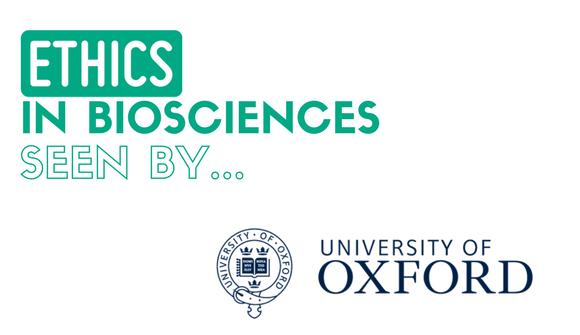How do you understand Ethics in biosciences research?
Ethics in biosciences research should be understood as means to ensure high-quality research and guarantee the protection of fundamental rights. Even though ethic principles are well defined and established, as biosciences research progresses, new ethical conflicts may arise. All biosciences research must be carried out within the good practice framework that Ethics represents.
What are the current standards and actions to achieve better Ethics in your University and in your country?
In the case of human subjects’ research, all research conducted on National Health Service (NHS) patients or their information must be approved by the Research Ethics Committee (REC) of the National Research Ethics Service (NRES) which coordinates RECs across the UK. If the research does not include NHS patients or their information, the University of Oxford has its own system of research ethics governance: the Central University Research Ethics Committee (CUREC). The majority of approvals are decentralised to Interdivisional RECs, and then to Departmental RECs.
In the case of research conducted on animals, the UK has strict regulations that are overseen by the Home Office Department of the Government. Researchers must be trained and be granted a Home Office License in order to be able to conduct research on animals.
What are you aiming for with the implementation of the STARBIOS2 actions towards better Ethics standards for your institute?
In relation to Ethics, our strategy is to raise awareness and evaluate the procedures for planning and including research ethical issues in researchers’ work via discussions with them, collaborate on research proposals with the Oxford BRC Ethics Research Fellow, and conduct research within the Oxford BRC research themes in this respect.
What kind of actions are you going to establish to fulfil your objectives?
In close collaboration with NIHR Oxford BRC Ethics Research Fellow and through reviews, we plan to explore the relationships between the public, genomic medicine researchers, and genomic commercial companies with respect to the acceptability of practices aiming to improve healthcare. We will also review processes in relation to consent from patients at the boundary of the ability to consent. This will be explored by focusing on cardiovascular and emergency medicine research as strategies for consent are needed for patients participating in critical care research.
Who is involved, from your University, in the AP in order to complete your final objective?
Our work requires a close collaboration between STARBIOS2 team, Dr Mark Sheehan (University of Oxford and NIHR Oxford BRC Ethics Research Fellow), and his team. We are excited to cultivate this relationship.
Read our previous Q&A with the University of Oxford on “Education as a key RRI issue”.








